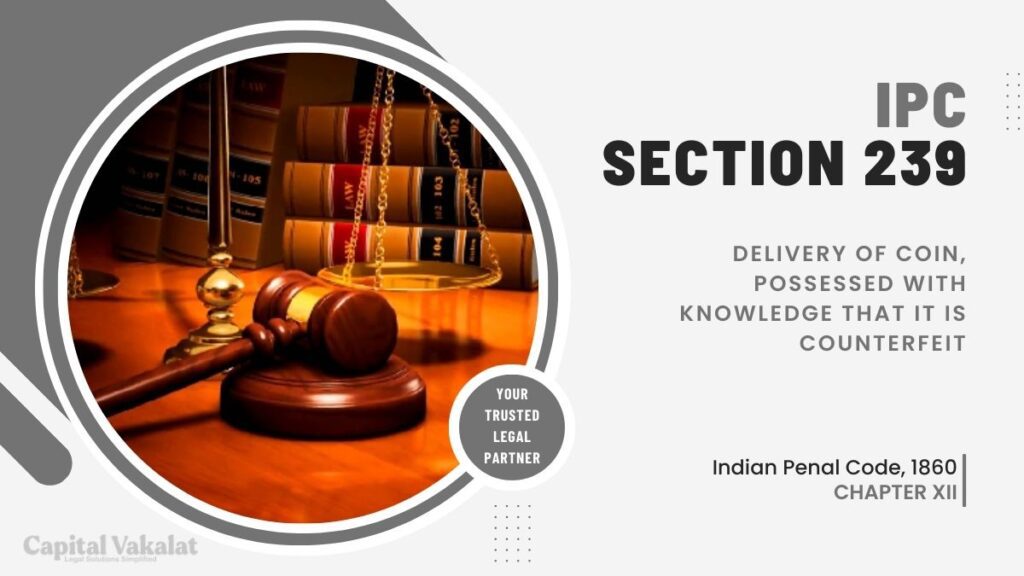Section 239 of the Indian Penal Code (IPC) deals with the offense of ‘Delivery of Coin, Possessed with Knowledge that it is Counterfeit.’ This legal provision is essential for maintaining the integrity of financial transactions and preventing the circulation of counterfeit currency.

Understanding the Legal Framework
Elements of Section 239 IPC
To comprehend the gravity of this offense, we must first understand its essential elements. To convict someone under Section 239 IPC, the prosecution must establish the following:
- The accused delivered a coin.
- The accused possessed knowledge that the delivered coin was counterfeit.
The delivery of a counterfeit coin knowingly is the crux of this offense.
Significance of ‘Delivery of Coin’
The term ‘delivery’ in this context refers to the act of transferring or passing on a coin to another party. It can occur in various situations, such as during a purchase, a business transaction, or even in the regular course of trade.
Knowledge of Counterfeit Coins
What Constitutes Knowledge of Counterfeit Coins
To establish an offense under Section 239 IPC, it is crucial to prove that the accused had knowledge of the counterfeit nature of the coin. Mere possession of a counterfeit coin is not sufficient to secure a conviction. The prosecution needs to show that the accused was aware of the coin’s counterfeit nature.
Legal Implications
Possessing and delivering counterfeit coins can have severe legal consequences. Individuals involved in such activities can face criminal charges and penalties, affecting their reputation and future prospects. The law aims to deter people from participating in activities that undermine the financial stability of the country.
Prosecution and Penalties
Prosecution Process
When someone is charged with violating Section 239 IPC, the legal process involves a trial in court. The prosecution will present evidence to prove that the accused knowingly delivered a counterfeit coin. This may include eyewitness testimonies, expert opinions, or any other relevant proof.
Penalties for Violation
If found guilty, the accused can face penalties, including imprisonment and fines. The severity of the punishment depends on the seriousness of the offense and may vary from case to case. The legal system strives to ensure that those involved in the circulation of counterfeit coins face appropriate consequences.
Judicial Interpretations
Landmark Cases
Over the years, Indian courts have dealt with cases related to Section 239 IPC, and their interpretations have set legal precedents. These landmark cases provide insight into the application and nuances of the law. Understanding how the law has evolved can be valuable for legal practitioners and the general public.
Preventive Measures
How to Avoid Legal Issues
To avoid getting entangled in legal issues related to Section 239 IPC, it is essential to exercise caution in financial transactions. Here are some practical steps you can take:
- Be Vigilant: Always check the currency you receive in transactions for any signs of counterfeiting.
- Educate Yourself: Learn about the security features of currency notes and coins issued by the government.
- Use Authorized Channels: When in doubt, always use authorized banking and financial channels for transactions.
- Report Suspected Counterfeits: If you come across counterfeit currency, report it to the authorities promptly.
The Importance of Upholding Section 239 IPC
Section 239 IPC plays a vital role in preserving the integrity of India’s financial system. By penalizing those who knowingly circulate counterfeit coins, it acts as a deterrent and safeguards the trust people place in the currency. Upholding this law is crucial for maintaining economic stability and security.
Conclusion
Section 239 IPC serves as a legal safeguard against the circulation of counterfeit coins, ensuring the credibility of India’s financial transactions. Understanding the elements and consequences of this offense is vital for individuals and businesses alike. By adhering to lawful practices and promoting awareness, we can contribute to a financially secure environment.
Frequently Asked Questions
What is the significance of proving knowledge of counterfeiting in court?
Proving the accused’s knowledge of counterfeiting is crucial for securing a conviction under Section 239 IPC.
Are there any defenses against charges under Section 239 IPC?
Yes, defenses may include lack of knowledge, mistaken identity, or insufficient evidence.
Can individuals take preventive measures to avoid receiving counterfeit coins?
Yes, individuals can stay vigilant, educate themselves, and use authorized channels to reduce the risk of receiving counterfeit coins.
How does the law differentiate between delivering counterfeit coins knowingly and unknowingly?
The law relies on evidence and circumstances to establish whether the accused had knowledge of the coin’s counterfeit nature. It is determined on a case-by-case basis.